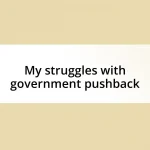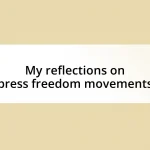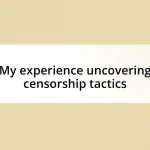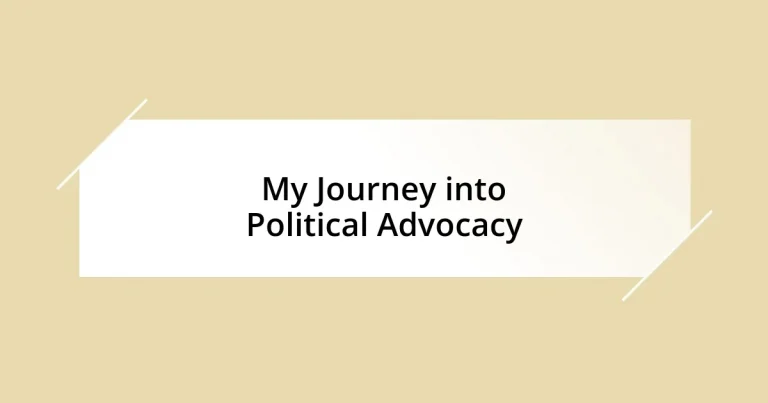Key takeaways:
- Political advocacy is driven by personal experiences and emotions, fostering a collective movement for social change.
- Effective advocacy requires ongoing learning, skill development, and building connections with mentors and influential figures.
- Engaging the community is essential, as it enables open dialogue, shared experiences, and collective action.
- Measuring success in advocacy should include both qualitative and quantitative outcomes, with a focus on community impact and personal reflections.
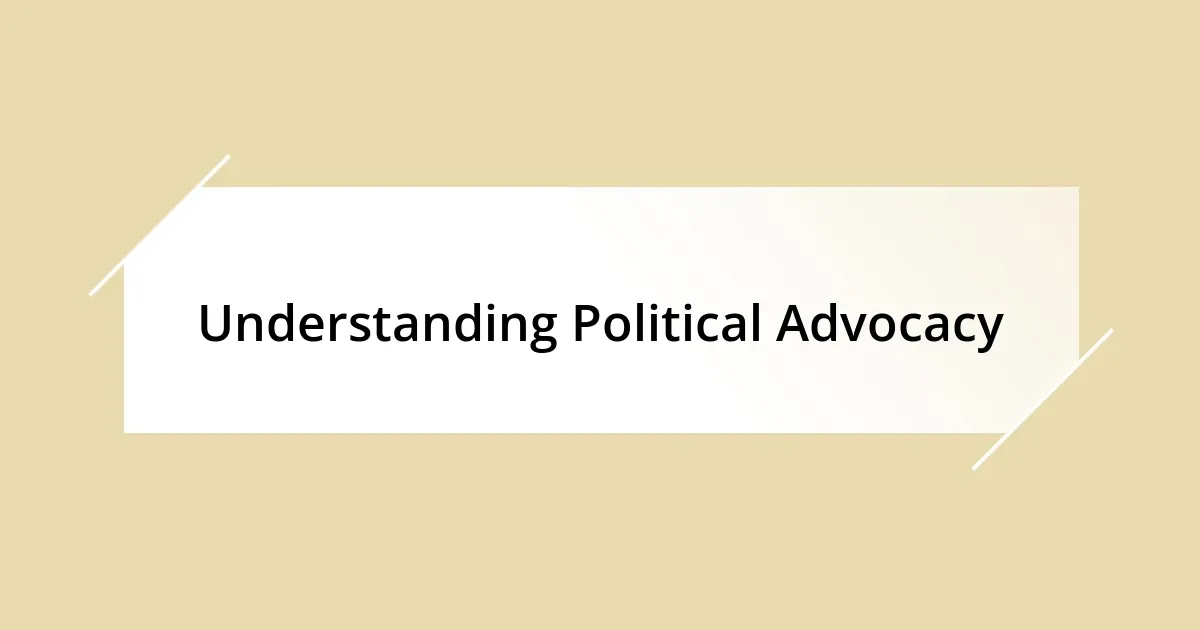
Understanding Political Advocacy
Political advocacy is more than just a buzzword; it’s the active pursuit of influencing decision-makers to enact change. I’ll never forget my first experience standing in a crowded room, surrounded by passionate individuals, all united by a common cause. That palpable energy made me realize advocacy isn’t just about making a case—it’s about creating a movement that resonates on a deeply emotional level.
When I think about political advocacy, I often wonder: what drives people to dedicate their time and efforts to this cause? For me, it was witnessing the struggles of my community firsthand. Whether it was advocating for educational reforms or environmental justice, I could see how a passionate plea could inspire others to join the fight. It’s these personal experiences, whether heartwarming or heartbreaking, that fuel our commitment to social change.
Moreover, understanding political advocacy means recognizing that it encompasses a variety of tactics, from grassroots organizing to lobbying efforts. I recall a time when I sat with local leaders, brainstorming strategies to communicate our message effectively. That collaboration taught me that every voice matters; those small, individual actions culminate into significant shifts in public policy. Have you ever thought about how your own experiences could contribute to a larger narrative?

Finding Your Passion
Finding your passion in political advocacy is like navigating a big, bustling city. You might feel lost at first, but each experience along the way helps illuminate your path. I remember the day I stumbled across a community meeting while running errands. The energy in that room was electric, and suddenly, I felt a yearning to be part of something bigger. It was a spark that ignited my interest in issues I never knew mattered to me—issues that deeply affected my community.
As I explored various causes, I began to identify what truly resonated with me. It’s incredibly important to align your advocacy efforts with your core values. Here’s how you can start finding your passion:
- Reflect on Personal Experiences: Consider moments in your life that have shaped your beliefs.
- Engage with Your Community: Attend local events to see where you feel a connection.
- Research Different Issues: Dive into various topics; sometimes you’ll find a cause that unexpectedly speaks to you.
- Talk to Like-Minded People: Conversations can inspire new ideas and strengthen your commitment.
- Trust Your Instincts: If your heart races when discussing an issue, you might be onto something significant.
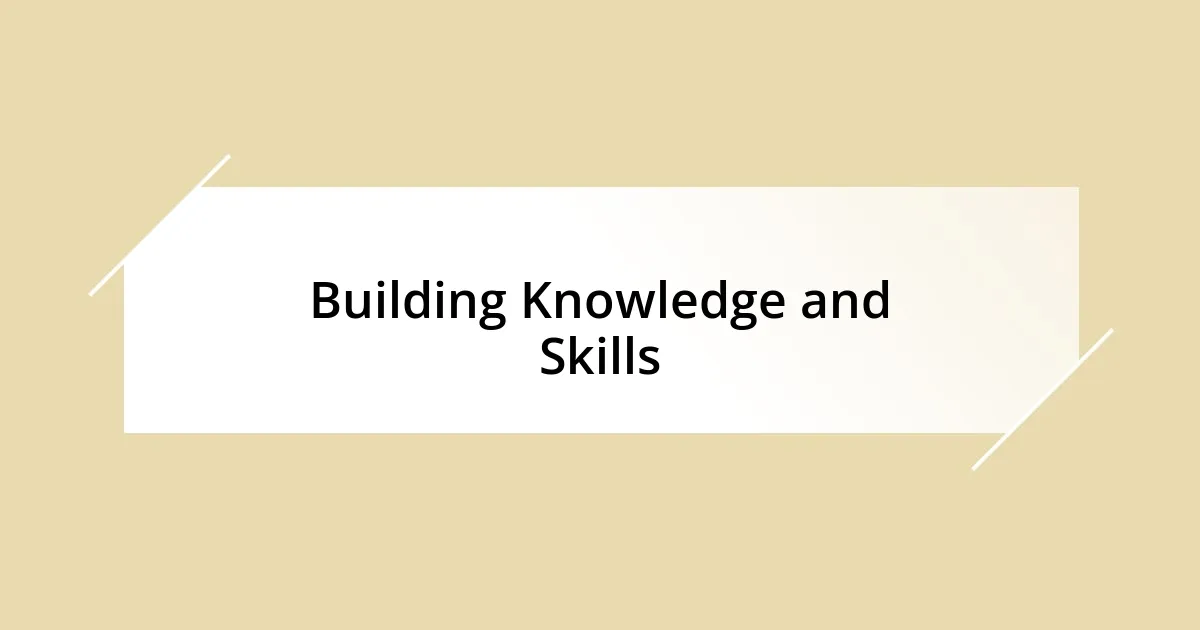
Building Knowledge and Skills
Building expertise in political advocacy isn’t something that happens overnight; it’s a journey that requires continuous learning and skill development. I vividly remember attending a workshop on effective communication strategies. The facilitators emphasized the importance of storytelling in advocacy, and that stuck with me. Afterward, I applied what I learned by crafting my own narratives around local issues, which not only engaged my audience but also inspired them to take action. Have you thought about how honing your communication skills could strengthen your advocacy efforts?
As I delved deeper into political advocacy, I realized that research is a crucial component. The more informed I became about policies and social issues, the more confident I felt voicing my opinions. I often spent weekends sifting through reports and academic articles, and with each piece of knowledge gained, I could see the bigger picture more clearly. That understanding allowed me to engage in discussions with diverse groups effectively, bridging gaps between different perspectives. Building knowledge doesn’t just equip you; it empowers you to advocate with conviction.
I also found that forming connections with mentors broadened my understanding of advocacy. I’ll never forget one mentor who had a wealth of experience in lobbying. She often shared that her greatest lessons came from hands-on experiences rather than textbooks. I approached my journey with the same mindset; I actively sought out volunteers and seasoned advocacy professionals. Each interaction served as a lesson, and these relationships became invaluable anchors in my growth. Have you considered the impact of mentorship in your advocacy journey?
| Knowledge and Skills | Importance |
|---|---|
| Effective Communication | Engages and inspires action |
| In-Depth Research | Informs and empowers confidence |
| Mentorship | Provides guidance and perspective |
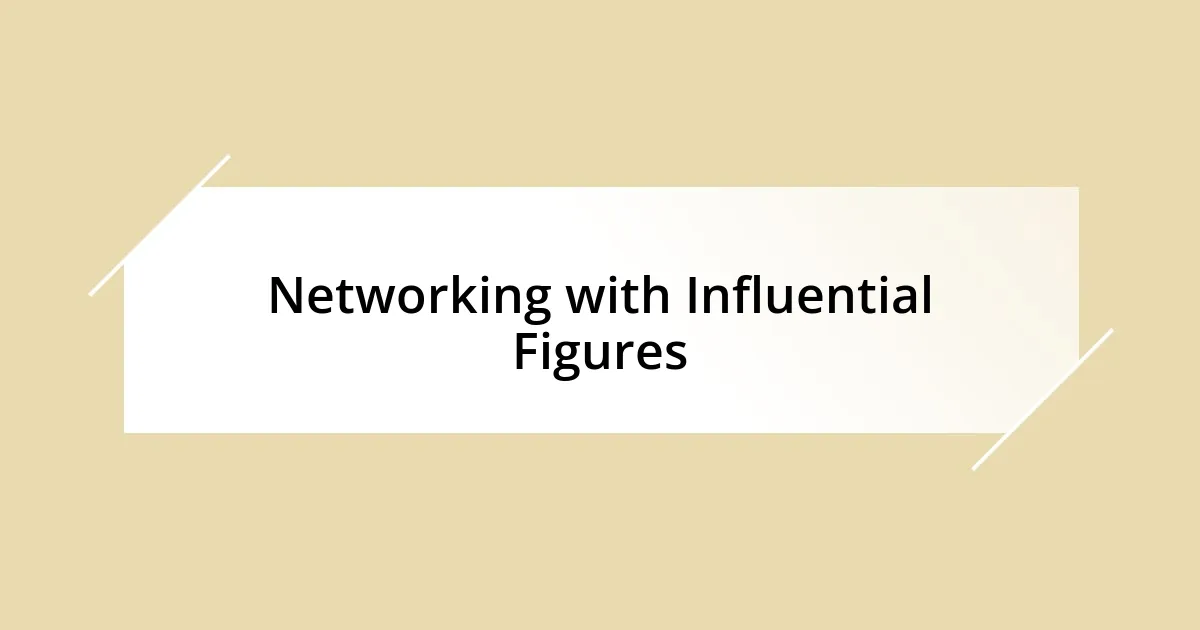
Networking with Influential Figures
Connecting with influential figures was one of the pivotal moments in my journey. I remember attending a political gala where I felt both excited and nervous. It was there that I met a state senator whose policies I admired. I took a deep breath, introduced myself, and we ended up having a meaningful conversation about grassroots advocacy. That interaction not only inspired me but also opened doors I never anticipated. Have you ever experienced that rush of possibility when you connect with someone who shares your vision?
Another remarkable experience happened at a local advocacy conference. I spotted a well-known activist giving a keynote address. After the event, I mustered the courage to approach her and discuss ideas I had about community outreach. To my surprise, she was receptive and shared her journey, highlighting how networking shaped her path. That one conversation solidified the idea that relationships in advocacy can lead to shared projects and mutual support. Isn’t it incredible how a single discussion can fuel future endeavors?
I’ve found that following up with influential figures after meetings or events pays off immensely. A simple thank-you email or sharing an article relevant to our conversation establishes rapport and keeps the lines of communication open. I once reconnected with a campaign manager this way, and it led to an internship that expanded my understanding of political strategy. Have you reached out to someone after an initial meeting? You might be surprised by the opportunities that arise when you take that extra step to nurture your connections.
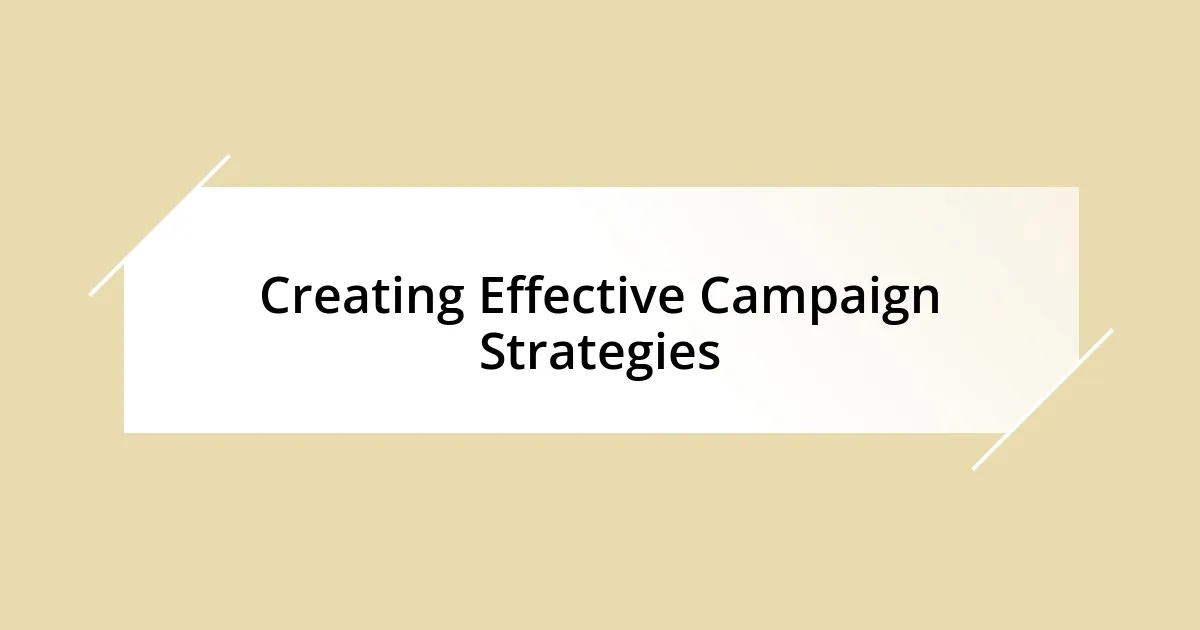
Creating Effective Campaign Strategies
Creating effective campaign strategies begins with a clear understanding of your goals and objectives. Reflecting on my own experience, I remember drafting a campaign plan for a local initiative. I gathered input from community members, which helped me define our objectives more precisely. Have you considered how involving your audience early on can shape a more impactful campaign?
Another key element is targeting the right audience. I once found myself frustrated when my message didn’t resonate with local voters. It took time to realize that my approach lacked a clear understanding of their concerns. So, I turned to surveys and feedback sessions. By learning what mattered to them, I adjusted my messaging and saw engagement increase dramatically. How often do you take the time to listen before launching your campaign?
Finally, I’ve learned the value of storytelling in captivating an audience. I recall sharing a personal story during a campaign event that connected my experiences to the issues at hand. The room quieted, and I could see the audience’s empathy grow. It reminded me that people are inspired by authenticity. Have you tapped into your own narrative to make your campaign more relatable? Using stories can be a powerful tool to bridge gaps and ignite passion in your supporters.
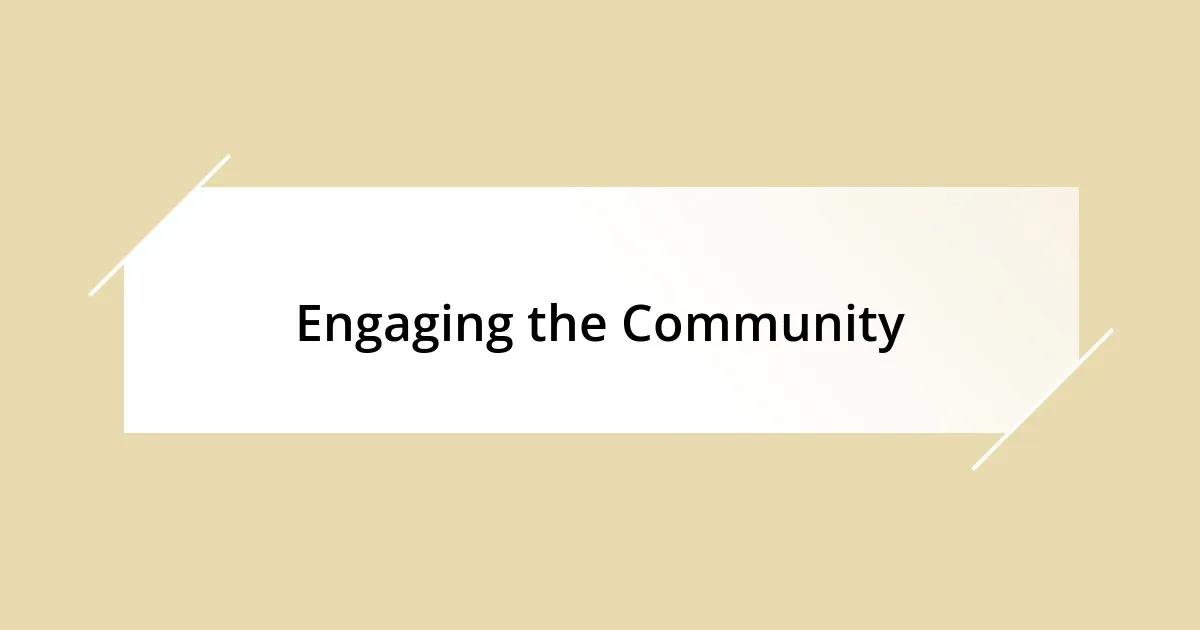
Engaging the Community
Engaging the community isn’t just a checkbox on a to-do list; it’s the heartbeat of advocacy. I vividly recall organizing a community forum in my neighborhood, which initially felt daunting. Yet, as people from diverse backgrounds poured in, it became clear that their voices were as eager to be heard as I was to listen. Have you ever noticed how bringing people together can foster incredible energy? It was in that space of open dialogue that I witnessed real connections form, and ideas blossom.
I often think about my first local cleanup initiative. I reached out to friends and neighbors, but to my surprise, it was a single flyer posted at the local coffee shop that ignited widespread interest. That small act sparked conversations among strangers about environmental issues. Have you considered the power of simple invitations? Seeing community members unite for a common cause reminded me that advocacy starts with participation and shared passion. When you create opportunities for engagement, you unveil the potential for collective action.
One memorable moment I cherish is when a quiet individual in attendance shared their story at the end of a community meeting. Their vulnerability shifted the tone of the discussion. It left me pondering how many untold stories are waiting in our communities. How often do we provide a platform for those voices? By allowing individuals to express themselves, we not only create a space for healing but also deepen our understanding of the community’s needs. Engaging authentically with your community can transform advocacy into something deeply personal and impactful.
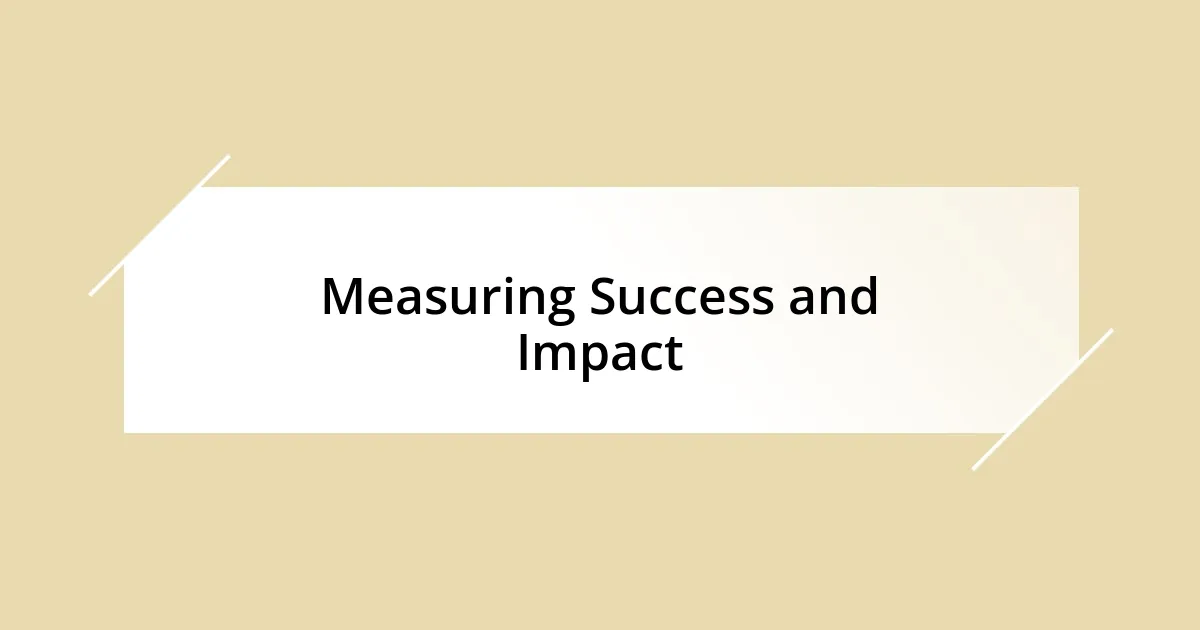
Measuring Success and Impact
Measuring success in political advocacy isn’t always about tallies or formal metrics; it often resides in the stories and changes we observe in our communities. I remember feeling a surge of satisfaction after implementing a small local policy change. The real impact became evident as I overheard a neighbor discussing how it improved their daily life. Hasn’t it struck you that sometimes the most profound victories are those that emerge quietly, away from the spotlight?
In my journey, I’ve also realized the importance of setting specific, measurable goals. Early on, I would celebrate vague achievements, only to later feel unsatisfied. This changed when I began tracking key indicators like community participation rates and changes in public sentiment. By employing simple tools like surveys, I could now assess the tangible effects of our initiatives. How might you refine your definition of success to include both the qualitative and quantitative aspects?
Lastly, reflection plays a crucial role in gauging our advocacy’s impact. After each campaign, I took the time to gather feedback, which often unveiled surprising insights. During one campaign, I was shocked to find out that people connected with my message not because of the facts I presented but due to the feelings I evoked. Have you thought about how your audience perceives your efforts? Embracing this feedback helped me iterate and grow, ultimately making my advocacy more effective and resonant.




